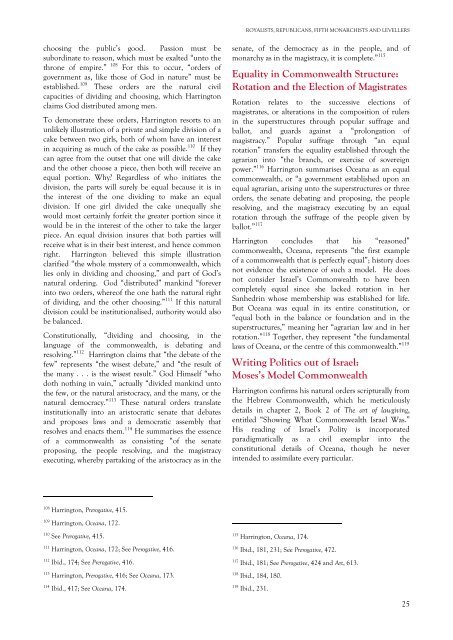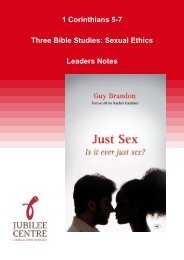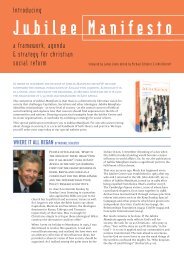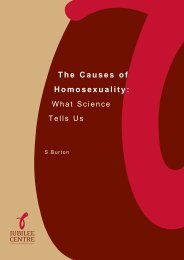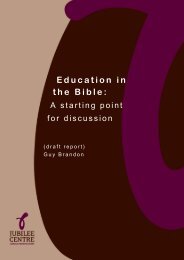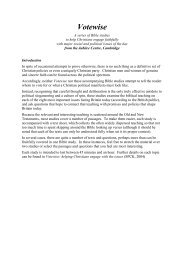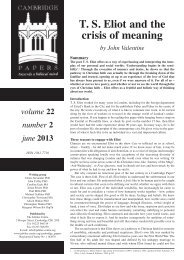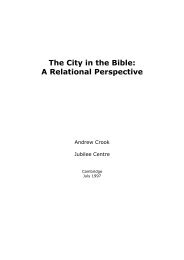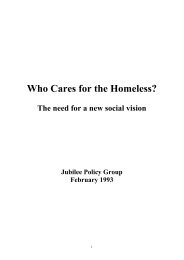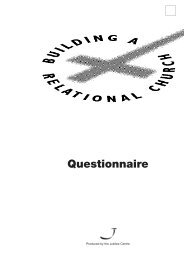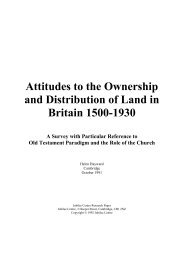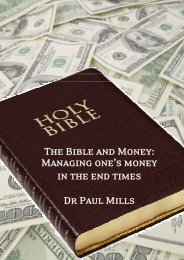Report Template - Jubilee Centre
Report Template - Jubilee Centre
Report Template - Jubilee Centre
Create successful ePaper yourself
Turn your PDF publications into a flip-book with our unique Google optimized e-Paper software.
ROYALISTS, REPUBLICANS, FIFTH MONARCHISTS AND LEVELLERS<br />
choosing the public’s good. Passion must be<br />
subordinate to reason, which must be exalted “unto the<br />
throne of empire.” 108 For this to occur, “orders of<br />
government as, like those of God in nature” must be<br />
established. 109 These orders are the natural civil<br />
capacities of dividing and choosing, which Harrington<br />
claims God distributed among men.<br />
To demonstrate these orders, Harrington resorts to an<br />
unlikely illustration of a private and simple division of a<br />
cake between two girls, both of whom have an interest<br />
in acquiring as much of the cake as possible. 110 If they<br />
can agree from the outset that one will divide the cake<br />
and the other choose a piece, then both will receive an<br />
equal portion. Why? Regardless of who initiates the<br />
division, the parts will surely be equal because it is in<br />
the interest of the one dividing to make an equal<br />
division. If one girl divided the cake unequally she<br />
would most certainly forfeit the greater portion since it<br />
would be in the interest of the other to take the larger<br />
piece. An equal division insures that both parties will<br />
receive what is in their best interest, and hence common<br />
right. Harrington believed this simple illustration<br />
clarified “the whole mystery of a commonwealth, which<br />
lies only in dividing and choosing,” and part of God’s<br />
natural ordering. God “distributed” mankind “forever<br />
into two orders, whereof the one hath the natural right<br />
of dividing, and the other choosing.” 111 If this natural<br />
division could be institutionalised, authority would also<br />
be balanced.<br />
Constitutionally, “dividing and choosing, in the<br />
language of the commonwealth, is debating and<br />
resolving.” 112 Harrington claims that “the debate of the<br />
few” represents “the wisest debate,” and “the result of<br />
the many . . . is the wisest result.” God Himself “who<br />
doth nothing in vain,” actually “divided mankind unto<br />
the few, or the natural aristocracy, and the many, or the<br />
natural democracy.” 113 These natural orders translate<br />
institutionally into an aristocratic senate that debates<br />
and proposes laws and a democratic assembly that<br />
resolves and enacts them. 114 He summarises the essence<br />
of a commonwealth as consisting “of the senate<br />
proposing, the people resolving, and the magistracy<br />
executing, whereby partaking of the aristocracy as in the<br />
senate, of the democracy as in the people, and of<br />
monarchy as in the magistracy, it is complete.” 115<br />
Equality in Commonwealth Structure:<br />
Rotation and the Election of Magistrates<br />
Rotation relates to the successive elections of<br />
magistrates, or alterations in the composition of rulers<br />
in the superstructures through popular suffrage and<br />
ballot, and guards against a “prolongation of<br />
magistracy.” Popular suffrage through “an equal<br />
rotation” transfers the equality established through the<br />
agrarian into “the branch, or exercise of sovereign<br />
power.” 116 Harrington summarises Oceana as an equal<br />
commonwealth, or “a government established upon an<br />
equal agrarian, arising unto the superstructures or three<br />
orders, the senate debating and proposing, the people<br />
resolving, and the magistracy executing by an equal<br />
rotation through the suffrage of the people given by<br />
ballot.” 117<br />
Harrington concludes that his “reasoned”<br />
commonwealth, Oceana, represents “the first example<br />
of a commonwealth that is perfectly equal”; history does<br />
not evidence the existence of such a model. He does<br />
not consider Israel’s Commonwealth to have been<br />
completely equal since she lacked rotation in her<br />
Sanhedrin whose membership was established for life.<br />
But Oceana was equal in its entire constitution, or<br />
“equal both in the balance or foundation and in the<br />
superstructures,” meaning her “agrarian law and in her<br />
rotation.” 118 Together, they represent “the fundamental<br />
laws of Oceana, or the centre of this commonwealth.” 119<br />
Writing Politics out of Israel:<br />
Moses’s Model Commonwealth<br />
Harrington confirms his natural orders scripturally from<br />
the Hebrew Commonwealth, which he meticulously<br />
details in chapter 2, Book 2 of The art of lawgiving,<br />
entitled “Showing What Commonwealth Israel Was.”<br />
His reading of Israel’s Polity is incorporated<br />
paradigmatically as a civil exemplar into the<br />
constitutional details of Oceana, though he never<br />
intended to assimilate every particular.<br />
108<br />
Harrington, Prerogative, 415.<br />
109<br />
Harrington, Oceana, 172.<br />
110<br />
See Prerogative, 415.<br />
111<br />
Harrington, Oceana, 172; See Prerogative, 416.<br />
112<br />
Ibid., 174; See Prerogative, 416.<br />
113<br />
Harrington, Prerogative, 416; See Oceana, 173.<br />
114<br />
Ibid., 417; See Oceana, 174.<br />
115<br />
Harrington, Oceana, 174.<br />
116<br />
Ibid., 181, 231; See Prerogative, 472.<br />
117<br />
Ibid., 181; See Prerogative, 424 and Art, 613.<br />
118<br />
Ibid., 184, 180.<br />
119<br />
Ibid., 231.<br />
25


